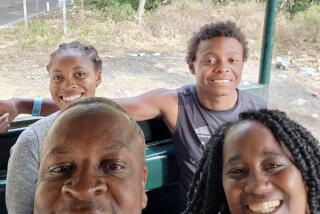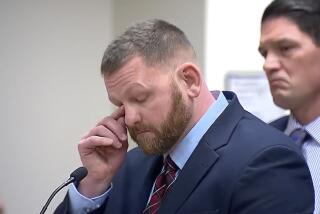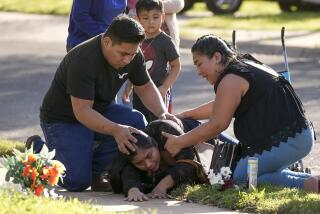‘Faith, family, football’: How a Texas town is healing after a cop killed a black teenager

Odell Edwards sat in a corner of the bleachers away from the other parents. He didn’t want to be a distraction.
He knew that if they spotted him, they would walk over solemnly, offer hugs, prayers, or recall his youngest son’s smile and athleticism. So he sat alone.
As Edwards scanned the brightly lit turf where the Mesquite High School football team would play their season opener, he paused to look at the new decal on the back of each player’s maroon helmet, white circles with two maroon letters: “JE.”
For his 15-year-old son, Jordan Edwards.
“Every day I think about him being gone way too soon,” Edwards said. “It would have been nice to see him out there on the field one more time.”
Jordan died in April when a police officer fired on a car filled with black teenagers as it pulled away from a house party. It was another case of an unarmed African American killed by a white officer. In Mesquite and other suburbs east of Dallas, the reactions echoed those after similar shootings elsewhere — anger, disbelief, resignation.
On the Mesquite football team — the Skeeters — coaches have become grief counselors of sorts. They try to honor Jordan’s memory while urging their players to focus on the future, both as athletes and young men. Since the shooting, Jordan’s teammates have become more wary. At least one turned to prayer.
Although a Dallas County grand jury indicted the officer on a murder charge — rare for a police shooting in Texas — the Edwards family knows history. They know an indictment is one thing, a conviction is another. In recent months, police from Ohio to Oklahoma have been acquitted in shootings of unarmed black men and children. The last time an on-duty police officer in Dallas County was convicted of murder was in 1973.
But people here have found a way to make it not matter so much what happens in the courtroom. The officer’s fate is not in their hands. They turn to the Skeeters’ team motto, the things that have always gotten them through: Faith. Family. Football.
::
Like most Saturdays, April 29 was chore day in the Edwards home, a two-story brick house with a neat lawn in a subdivision dotted with cul-de-sacs.
Jordan and his older brothers — Kevon and Vidal, both 17 — cleaned their bedrooms and vacuumed the house. That evening, the boys asked if they could go to a party three miles away in neighboring Balch Springs. Their father agreed, but told them to be home by midnight.
“It was a great day,” Edwards said, smiling as he reminisced. “We were all together.”
The boys got to the party about 10 p.m., and already teenagers were dancing to the latest hip-hop hits and bragging about plans for the summer. Within an hour, Balch Springs Police Officer Roy Oliver and his partner showed up, responding to a noise complaint. While inside the house breaking up the party, Oliver — a six-year veteran of the department — heard what sounded like gunshots coming from outside. He hurried out to his patrol car and grabbed an MC5 rifle.
Outside, the Edwards boys had hopped into Vidal’s black Chevy Impala. Jordan picked the front passenger seat. The car pulled away from the curb, and whether the boys heard an order to stop is unclear. Oliver raised his rifle and started shooting. A bullet tore through Jordan’s head. The other boys, uninjured, stared at the pooling blood.
Police spokesmen initially said the vehicle had backed up toward Oliver “in an aggressive manner,” but later they backtracked and reported that body camera video showed the Impala was driving away from the officers. The gunshots officers had heard were real, but had come from a parking lot a block away.
Days later, Oliver, 38, whose attorney did not respond to a request for comment, was fired. He was indicted for first-degree murder in July, and the Edwards family has filed an excessive-force lawsuit against him.
“He robbed Jordan’s life,” said Charmaine Edwards, Jordan’s mother. “That’s all there is to it.”
One evening, Charmaine, with tears rolling down her cheeks, sat at the family’s kitchen table — a spot of many memories: Jordan scarfing down chicken alfredo, joking with his brothers and 5-year-old sister, Korrie, talking about the driving lessons he was scheduled to start in August.
Jordan’s upstairs bedroom looks almost exactly as it did that day in April: a stool in front of the television where he played “NBA 2K”; his favorite red-and-black gym shorts balled up on the floor; his pet iguana, Roxie, lying in her glass cage near his bed.
“Kids go to parties all the time and come home,” Charmaine said, pausing for a moment. “Not mine.”
::
Jeff Fleener, the first-year head football coach at Mesquite, had known Jordan only for a few months, but the boy teammates and coaches called “J-Bird,” “J-Money” and “Smiley” already had left an impression. He was tall and lanky and would likely — as a sophomore this school year — have played some varsity.
The first spring practice, which had been scheduled for the Monday after the shooting, was canceled. When Odell and Charmaine arrived at the school that day, the players lined up to offer condolences.
“They all just waited and waited and waited to just have the chance to walk up and give his dad a hug, to give his mom a hug, to give his brother a hug,” Fleener said. “Guys were tore up and still are tore up.”
Small memorials dot the team’s locker room. “Long live #11” appears in fading marker on whiteboards and doors. Jordan’s locker sits untouched, except for little “RIP” notes placed around his size 10½ Adidas.
Ja’Darion Smith, 15, said he found himself praying in the days after Jordan’s death and hasn’t been able to stop: before bed each night, as he walks the hallways in between classes, on the football field, looking across the line of scrimmage to where Jordan used to stand as a safety — smiling, laughing and ready to offer a tap on top of the helmet after a play.
A lot of the time it’s not God he’s talking to, Ja’Darion admits. It’s Jordan.
“It gives me peace a little bit; praying helps me cope,” Ja’Darion said as he walked off the practice field a few days before the season opener. “I just tell him I love him.”
Nearby, Jaxon Turner, 16, sipped purple Gatorade and wiped the sweat dripping down his face in the muggy afternoon air. Jordan’s death, he said, made him more cautious. He hasn’t gone to a house party since the shooting.
“Even if you’re aware of your surroundings, like Jordan was, it still might not matter, which is sad,” Jaxon added. “He was a good kid who was going to be a good man.”
To Vidal, that’s one of the most frustrating things — knowing how diligent his little brother was.
“He excelled at everything — school, football, you name it,” said Vidal, whose last image of his brother was as he slowly slumped down beside him in the car that night.
Boxing was always Vidal’s sport. This season he’s playing football. He’s wearing No. 11.
::
Hours before kickoff of the season opener, Fleener gathered the team in the school’s musty wrestling room. He held up three sheets of the glossy “JE” decals.
“As you put these on your helmets, this is his opportunity to play for the Skeeters,” Fleener said, his voice raspy. “When you put that on there, and you put that helmet on, you’re carrying him with you into every snap that you’re in that game.”
Ja’Darion peeled off a decal and gripped his helmet, pasting the initials on the back with intense concentration.
“When we tell you to put that helmet to work, just think you’re going to have that little extra hit, because you’re going to have Jordan on there right behind you,” Fleener continued.
“Just make sure you take the time to think about that, and how important that is to you and how important he is to us — everybody understand that?”
Some nodded. Some tilted their heads toward the ceiling, as if looking for a glimpse of Jordan in the fluorescent lights.
::
As each player filed out of the locker room before their first game, they raised their hands to tap a piece of white athletic tape placed over the door inscribed “LLJE 11.” Long Live Jordan Edwards.
“This is for you, J,” one player said.
“Never forget.”
“Always with us,” added another.
Tears streamed down Vidal’s cheeks as he left the locker room. Later, he carried the American flag as he led the team onto the field at Lake Highlands High School in northeastern Dallas. The sun began to set and the sky turned bright orange. Chants of “Go, Skeeters, Go!” filled the visitors’ side bleachers. The smell of grilled hot dogs and the rhythm of the band’s snare drums filled the air.
The Skeeters fell behind early but charged back before halftime, when Ja’Darion scored on a two-point conversion. He walked back to the sideline and knelt, saying a prayer.
From the corner of the bleachers, Odell Edwards watched the team fall behind, 20-12.
Hours before kickoff, he had visited his son’s grave, where he prayed and left a bag of Chester’s Flamin’ Hot Fries and a bottle of Fuze strawberry lemonade — two of Jordan’s favorites.
“I would always tell him never give up, keep pushing,” he said.
The Skeeters lost, but Charmaine, who’d joined her husband for the second half, found herself thinking about what Jordan would have done.
“He would have been upset,” she said. “But he would have been out there next week, ready to go.”
As the team walked off the field dejected, one player silently tapped the “JE” on his helmet.
Twitter: @kurtisalee
More to Read
Start your day right
Sign up for Essential California for news, features and recommendations from the L.A. Times and beyond in your inbox six days a week.
You may occasionally receive promotional content from the Los Angeles Times.







